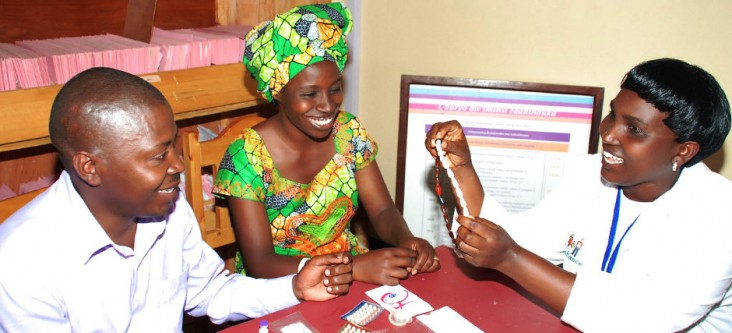- Work With USAID
- How to Work with USAID
- Organizations That Work With USAID
- Find a Funding Opportunity
- Resources for Partners
- Careers
- Get Involved
Speeches Shim

The maternal mortality rate in Uganda is one of the highest in the world, at an estimated maternal mortality of 343 deaths per 100,000 live births. With a high fertility rate and only 23% of women using contraception, the Government of Uganda has committed to reduce the unmet need for family planning to 10% and to increase the modern contraceptive prevalence rate to 50% by the year 2020.
This activity was part of a larger program to advance and support community programs that seek to improve the overall health of communities, especially in relationship to family planning. The activity prepared local leaders, including religious and community leaders, to discuss and promote healthy timing and spacing of pregnancies (HTSP) and to ensure that women are receiving access to quality family planning (FP) information and services from faith entities. As part of the project, the Uganda Protestant Medical Bureau (UPMB), with support from Christian Connections for International Health (CCIH), brought together more than 40 local leaders, and Ugandan government officials in Kampala, Uganda for a two-day meeting on the role of faith leaders in promoting healthy families and family planning. Discussions included the identification of family planning methods available, where to receive them, and support to improve couples’ communication around family care and wellbeing.
UPMB also conducted a two-day training for a diverse group of nearly 80 religious leaders, including Catholic, Muslim, Pentecostal and Protestants to equip them to discuss and promote healthy timing and spacing of pregnancies.
Religious leaders are some of the most important and respected opinion leaders in Ugandan society who can help educate their communities about the potential benefits of using HTSP using FP. By virtue of their status and position in society, religious and community leaders can play a critical role in the community to encourage healthy behaviors. Training of these leaders was central to the project and most attendees at the in-person meetings and sessions were from faith-based organizations. By educating local leaders that family planning can protect the health of women and their children through healthy birth spacing, CCIH was able to overcome social barriers to facilitate discussions.

Comment
Make a general inquiry or suggest an improvement.